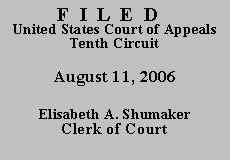

| MICHAEL P. DAVIDSON,
v.
DAVID R. McKUNE, Warden,
Lansing Correctional Facility; |
|
Mr. Davidson was convicted of first-degree murder in state district court, and his conviction was affirmed on appeal. State v. Davidson, 954 P.2d 702 (Kan. Mar. 6, 1998). His conviction became final on June 4, 1998,(1) the last day on which he could have filed a certiorari petition with the United States Supreme Court. See 28 U.S.C. § 2244(d)(1)(A); Clay v. United States, 537 U.S. 522, 527-28 (2003) (adding 90-day period in which defendant could seek certiorari). Thereafter, Mr. Davidson had one-year to file his federal habeas petition, but the time period would be tolled by the time a properly filed state post-conviction motion was pending. 28 U.S.C. § 2244(d)(1)(A), (d)(2). Thirty-five days elapsed without such a motion, (June 5-30 and July1-9). On July 10, 1998, Mr. Davidson filed a Kan. Stat. Ann. § 60-1507 post-conviction motion, which ultimately ended with a denial of review by the Kansas Supreme Court on March 31, 2004. Mr. Davidson filed his federal petition on March 18, 2005. The district court concluded that the period between March 31, 2004 and March 18, 2005 period had to be aggregated with the initial period in which a state post-conviction was pending, and therefore, the federal petition was untimely.
On appeal, Mr. Davidson first argues that he should have an additional 30 days from the denial of his state petition for review until the mandate became final and, in the alternative, he is entitled to equitable tolling because he relied on post-conviction counsel's incorrect guidance as to when his federal habeas petition had to be filed. Aplt. Br. at 12-16.
Mr. Davidson relies upon Bunny v. Mitchell, 262 F.3d 973, 974 (9th Cir. 2001) (per curiam), a case involving a California rule providing that a decision by the state supreme court became final 30 days after filing. Pursuant to Kan. S. Ct. R. 7.06, it does appear that Mr. Davidson had another 20-day period in which he could have filed a rehearing petition from the Kansas Supreme Court's order denying review, and we have held that such time is tolled under § 2244(d)(2). See Serrano v. Williams, 383 F.3d 1181, 1185 (10th Cir. 2004) (because New Mexico did not preclude the filing a rehearing petition to reconsider the denial of certiorari, that time would be tolled even where petitioner did not so file); Mills v. McKune, 2006 WL 1755962, at *2 (10th Cir. June 28, 2006) (unpublished) (applying Serrano to denial of review by Kansas Supreme Court); Thome v. Roberts, 2006 WL 1017646, at *2-3 (10th Cir. Apr. 19, 2006) (unpublished) (same). However, even with an additional 20 days of tolling, Mr. Davidson's petition is untimely, having been filed on the 366th day.(2)
Mr. Davidson also argues for equitable tolling based on a letter from post-conviction counsel advising that he had one-year from the date the Kansas Supreme Court denied review. Aplt. Br. at 12-13. We have rejected attorney miscalculation or mistake as to the limitations period as an "extraordinary circumstance" justifying equitable tolling. See Steed v. Head, 219 F.3d 1298, 1300 (10th Cir. 2000). Nor does Mr. Davidson have an ineffective assistance claim entitling him to equitable tolling. See 28 U.S.C. § 2254(i) ("The ineffectiveness or incompetence of counsel during Federal or State collateral post-conviction proceedings shall not be a ground for relief in a proceeding arising under section 2254."); United States v. Martin, 408 F.3d 1089, 1093 (8th Cir. 2005) (noting that ineffective assistance of counsel based on counsel's negligence or mistake has not been considered an extraordinary circumstance for equitable tolling).
We DENY a COA, and DISMISS this appeal.
Entered for the Court
Paul J. Kelly, Jr.
Circuit Judge
1. The district court determined that the limitations period began to run "on or before June 6, 1998." It would begin to run on June 5, 1998. See United States v. Hurst, 322 F.3d 1256, 1260 (10th Cir. 2003) (adopting Fed. R. Civ. P. 6(a) as the method of counting).
2. In addition to the 35 days previously mentioned, 330 days elapsed between April 20, 2004 (the last day on which a motion for rehearing could have been filed) and March 18, 2005 (the filing of Mr. Davidson's federal petition).